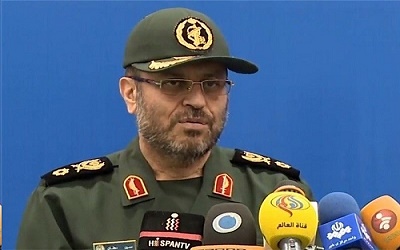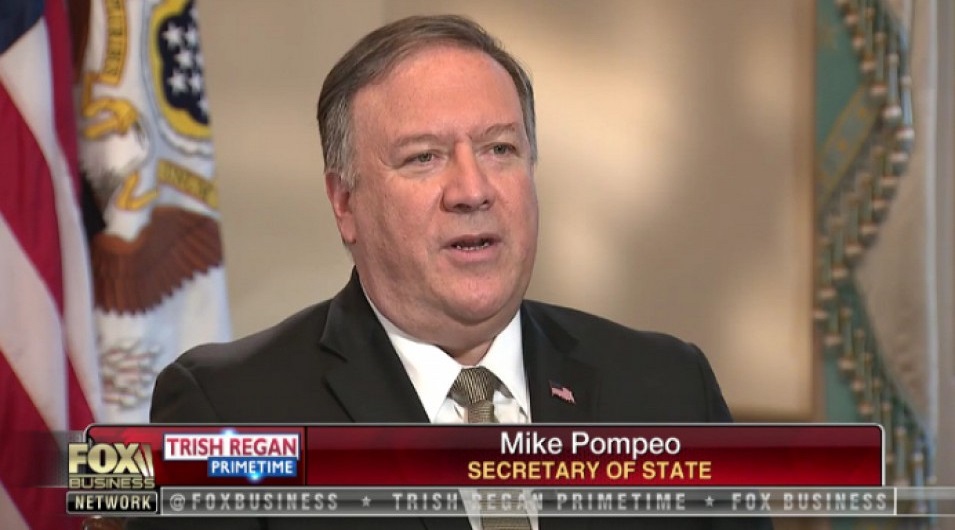Iranian War Threat: Secretary of State Pompeo Interviewed by Radio Television Suisse (RTS)

Secretary of State Mike Pompeo said on Monday that the President Donald Trump and his national security team are prepared to hold “unconditional” talks with their Iranian counterparts. Pompeo said he was calling for Iran to meet in order to quell rising tensions between the two nations that have caused uneasiness and a fear of armed conflict.
That said, Pompeo added that the United States will not stop trying to get the Islamic Republic run by Muslim clerics to cease its “adventurism” in the Middle East, Trump’s top diplomat told reporters.
Pompeo has repeated long-standing U.S. accusations that Iran is bent on destabilizing the region, but he also held out the possibility of talks as President Donald Trump has suggested. While the offer may not pan out, Pompeo made it during a visit to Switzerland, the country that long has represented American interests in Iran, as part of a European trip aimed at assuring wary leaders that the U.S. is not eager for war .

QUESTION: Mr. Secretary of State, good evening.
(In French.)
SECRETARY POMPEO: Good evening. It’s great to be with you.
QUESTION: The closer ties between USA and Switzerland are spectacular. What is the reason of this affection toward Switzerland?
(In French.)
SECRETARY POMPEO: Yeah, I think it’s very simple. We share a set of common values. The Trump administration believes that the best countries to continue to grow a relationship are those who have the shared understanding of freedom, of democracy, of liberty. Switzerland certainly has that. So we want to grow our economic ties, our security ties. All of the elements that make the two countries each more secure and more economically prosperous are something our administration’s been very focused on.
QUESTION: The fact that we are not in the European Union, is it a positive factor for you?
(In French.)
SECRETARY POMPEO: Well, what’s most important is that we find common ways to work together, and whether you’re in the EU or out of the EU, we want to develop these relationships that make Switzerland more economically successful and America as well.
QUESTION: But Switzerland is different?
(In French.)
SECRETARY POMPEO: Sometimes it’s a little bit easier to work with countries that don’t have the EU overlay. There’s no doubt about that. You have more capacity to make decisions more quickly. We appreciate that. But we work with many countries inside of the EU to develop better relationships with them as well.
QUESTION: You talked about Iran. Have you given Bern the direct call number by which the Iranians can call President Trump directly?
(In French.)
SECRETARY POMPEO: Let me say first that Switzerland’s done remarkable work that we’re very appreciative of in being our protective power there in Iran. But as for the phone number, I think Iran knows how to reach us if they’re ready. And when they’re ready, we’re ready to have a conversation with them as well.
QUESTION: They don’t call yet?
(In French.)
SECRETARY POMPEO: Not yet.
QUESTION: Could President Trump meet Mr. Rouhani or Ayatollah Khamenei personally?
(In French.)
SECRETARY POMPEO: For many months now President Trump has said he was prepared to negotiate. Remember, we have some basic requirements for Iran. We want them to cease their nuclear weapons programs and put a permanent halt to them. We want them to stop building up their missile systems in ways that present a threat to places like Switzerland. We want them to cease their terror campaign around the world that has displaced millions of people and killed hundreds of thousands of people. This is what we’re asking from Iran. And so when Iran is ready to have that conversation, a conversation about them seriously engaging as a nation in a normal way, we’re ready to have that conversation. It’ll happen at every level.
QUESTION: Like with Kim, is it possible?
(In French.)
SECRETARY POMPEO: Sure, I think it’s possible.
QUESTION: If Iran refuses to negotiate, is a military attack an option?
(In French.)
SECRETARY POMPEO: We couldn’t have been more clear over the past weeks and months we don’t intend war. Our effort is to have the Islamic Republic of Iran cease their revolutionary efforts around the world, to stop their missile program, and to engage with us seriously on a permanent solution to their nuclear program. Those are our objectives. We’ve used every diplomatic tool that we have, every economic tool that we have. That’s the path forward. And we have tried very diligently to deter Iran from attacking American interests throughout the Middle East as well, and we’ll continue to do that.
QUESTION: You have been head of the CIA. You said it would be aggressive and brutal. Is this still your vision?
(In French.)
SECRETARY POMPEO: Well, I don’t run the Central Intelligence Agency anymore, but it is the case – I want to make sure that America is successful and the West is successful, and our countries use power in ways that are appropriate to achieve those outcomes. I’m unabashed about my understanding that that’s best for every citizen of the world, and so where we find nations that aren’t engaged in activities that are consistent with that, we’re going to do our best to free them up so that they can express their religious freedoms, their rights to speak. We want good things for every citizen of the world, and we will use our capacity every place we can to achieve that.
QUESTION: The case of Iran has created division between you and Europe. Mr. – President Trump will meet Mr. Macron very soon. Has their personal connection been re-established?
(In French.)
SECRETARY POMPEO: So President Trump and President Macron speak all the time, both in person and by phone. I speak with my counterpart, Foreign Minister Le Drian, with great frequency as well. I think that —
QUESTION: But it was complicated because of climate change.
(In French.)
SECRETARY POMPEO: Well, yeah. We can talk about our decision to withdraw from the climate accord. What we hope is we’ll get real action. It’s one thing to be part of a club, part of a deal. It’s another thing to actually reduce your CO2 output. America has done that. We’re very proud of that achievement. And so we did have a disagreement on the JCPOA, but I must say I’ve been at this now 14 months, 15 months as the Secretary of State. I’ve watched how closely aligned we are in the understanding of the threat from Iran all across the West – the United States, Europe, and other democratic countries as well.
QUESTION: In Davos, you talked about Brexit, about the new power in Italy. What changes are you hoping for in Europe?
(In French.)
SECRETARY POMPEO: In my remarks, I was actually just simply reflecting reality. It wasn’t about what America wanted or didn’t want. This is about what the citizens of these countries want and are choosing, and we watched. We’ve watched the changes that have taken place in the United Kingdom. We watched the changes that are taking place in France with the protests. We’ve watched what’s going on in Italy. This is the reality that I think world leaders, national leaders need to understand and use – use to the benefit of the people of their countries. That’s what America wants. America wants good things. Right. President Trump talks about America first, taking care of the American people, making sure they grow. A component of that is making sure we have great partners all around the world.
QUESTION: But Brexit is a positive thing for you?
(In French.)
SECRETARY POMPEO: Brexit will be decided by the people of the United Kingdom —
QUESTION: Sure. Of course.
SECRETARY POMPEO: — and I would hope that they do so quickly.
QUESTION: For some Europeans, you are a hardliner about torture, about waterboarding and so on. Someone who is frightened, what should you reply to them?
(In French.)
SECRETARY POMPEO: The United States is unambiguous. We never conduct torture, period, full stop.
QUESTION: (In French.)
You applied it.
SECRETARY POMPEO: I’m sorry. I’m sorry.
QUESTION: You said the torture is – could be necessary.
(In French.)
SECRETARY POMPEO: No, the United States has never taken the position that torture is either lawful or appropriate, and we’ve not engaged in it. And President Trump has made very clear that he won’t either.
QUESTION: Last question: Do you want the U.S. to continue being the world’s policeman?
(In French.)
SECRETARY POMPEO: You’ve watched President Trump take an approach which says we want partners all around the world. So on North Korea, we’ve done that. We got a UN Security Council resolution set, passed, that is the most stringent in all of history. We’ve got a big coalition now working to create democracy and freedom in Venezuela, now some 55, 56 nations strong. We have worked to build out coalitions. America wants partners in every effort to enhance the capacity for freedom and democracy all around the world. We can’t do it alone, and we’re looking towards countries like Switzerland and others to assist us in this.
QUESTION: (In French.) Mr. Secretary of State, thank you. (In French.)
SECRETARY POMPEO: Thank you. Good evening.
QUESTION: (In French.)
SECRETARY POMPEO: (Laughter.) Thank you. Merci beaucoup.
QUESTION: Merci beaucoup. Thank you.
SECRETARY POMPEO: Thank you.
QUESTION: Merci. Merci beaucoup.


